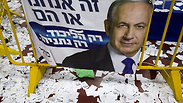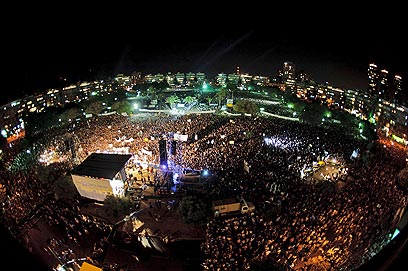
The language of security and fear has won
Op-ed: The transition from social-economic stories to national-political ones in the public discourse is not because the former have exhausted themselves. The turning point was caused by internalization, slow but invasive, of last year's election platforms. Netanyahu put the Jewish-Arab and Israeli-Palestinian conflict at the center of his campaign publicity. Herzog put society and the economy at the center of his.
In two months' time we'll be marking a year since the Knesset elections. On the face of it, they didn't change much. The same Netanyahu heads the government, the same Ya'alon heads security and another minister-who-isn't-Likud heads the treasury. Within the composition of the government, the ultra-Orthodox replaced Yesh Atid, but the new incumbents have not caused any political earthquakes.

But this summary is misleading. In 2015 we experienced a profound, even extreme, change in the public discourse in Israel. Look at the topics that that dominated the media a year ago (and two years ago, and three) and those that capture the headlines today.
Before, they seemed to be shouting about centralization, international companies' non-taxable income, the middle class getting poorer, the cost of living and even the natural gas plan.
Now the media – both establishment and social – features stormy discussions about Jewish-Arab relations, Palestinian and Jewish terror, the occupation (yes, the word "occupation") and annexation (yes, the word "annexation"). In the background is the growing and deepening formation of a bi-national state.
The transition from social-economic stories to national-political ones is not because the former have exhausted themselves. On the contrary: when the Trajtenberg Committee, which was established in the wake of the 2011 social protests, published its recommendations in the autumn of that year, Israel's economic situation – according to objective indexes – was better than it is today.

Apartments, for example, were 30 percent cheaper, poverty and inequality rates were lower, corporations paid higher taxes, all our pensions were more secure and there was growth that no longer exists.
It's not the economy. The turning point was caused by internalization, slow but invasive, of last year's election platforms. Netanyahu put the Jewish-Arab and Israeli-Palestinian conflict at the center of his campaign publicity. Herzog put society and the economy at the center of his.
Netanyahu flew to America to speak about the dangers to Israel of developments in the Muslim world in general, and a nuclear Iran in particular. Herzog went to development towns to speak about the cost of living and against tycoons.
Netanyahu warned his voters that Arabs were going to the voting booths in droves, bused in by the left. Herzog warned his voters about the passing of the gas deal.
Netanyahu forbade senior members of his party from speaking about social and economic issues, despite their being the source of the outgoing government's achievements, because he understood that it wouldn't win votes.
Meanwhile, Herzog banned his party members from talking about conflict and peace, because those managing his election publicity told him that it wouldn't win votes.
And then the voting slips spoke and it turned out that Netanyahu had rightly assessed the fears of the voters. He understood them.
That's how the change began. In the manner of changes to the general mood, the ruling paradigm in public opinion, the process was not immediate and sweeping. But the number of people who considered it essential to return to the fundamental questions about the state and its people, and about war and peace, grew by the day.
More and more intellectuals, opinion-makers, columnists, and concerned people from the broader public - on the left and on the right - started to write and speak about the need to shake up the agenda within the public-national discussion, for the sake of our soul.
The final straw came with the gas protests, which defined themselves as non-denominational, yet managed to draw only a few thousand out into the streets of Tel Aviv, the capital of protests.
The times have changed. Against the backdrop of the intifada of individuals, Israel of 2016 is returning to debate fundamental questions of its founding, its borders and its future. The country is going back to the opinion that "Silver Platter" is not just a television show about capitalists and the government, but rather Nathan Alterman's unforgettable poem about those who fell in the war of liberation and independence.










